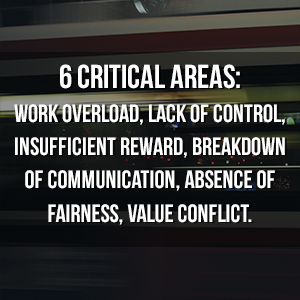This is part of a series publishing portions of a research paper on How a Leader Maintains High Productivity Without Team Burnout.
Appendix C: The six areas of job-person mismatch
A conceptual framework for the crises that disrupt the relationships people develop with their work.
“Each area of mismatch has a distinct relationship with burnout and engagement.” (Cooper, 1998, pp. 75) Cooper provides a concise, useful overview of these six areas of mismatch in his book:
- Work overload occurs when job demands exceed human limits. People have to do too much in too little time with too few resources. When overload is a chronic job condition, not an occasional emergency, there is little opportunity to rest, recover, and restore balance.
- Lack of control occurs when people have little control over the work they do, either because of rigid policies and tight monitoring or because of chaotic job conditions. Such lack of control prevents people from being able to solve problems, make choices, and have some input into the achievement of the outcomes for which they will be held accountable.
 Insufficient reward involves a lack of appropriate rewards for the work people do. This lack of recognition devalues both the work and the workers. Prominent among these rewards are external ones such as salary and benefits, but the loss of internal rewards (such as pride in doing something of importance and doing it well) can also be a critical part of this mismatch.
Insufficient reward involves a lack of appropriate rewards for the work people do. This lack of recognition devalues both the work and the workers. Prominent among these rewards are external ones such as salary and benefits, but the loss of internal rewards (such as pride in doing something of importance and doing it well) can also be a critical part of this mismatch.- Breakdown of community occurs when people lose a sense of positive connection with others in the workplace. Some jobs isolate people from each other, or make social contact impersonal. However, what is most destructive of community is chronic and unresolved conflict with others on the job. Such conflict produces constant negative feelings of frustration and hostility, and reduces the likelihood of social support.
- Absence of fairness occurs when there is a lack of a system of justice and fair procedures, which maintain mutual respect in the workplace. Unfairness can occur when there is inequity of workload or pay, or when there is cheating, or when evaluations and promotions are handled inappropriately. If procedures for grievance or dispute resolution do not allow for both parties to have voice, then those will be judged as unfair.
- Value conflict occurs when there is a mismatch between the requirements of the job and people’s personal principles. In some cases, people might feel constrained by the job to do things that are unethical or not in accord with their own values. For example, they might have to tell a lie or be otherwise deceptive or not forthcoming with the truth. In other instances, people may be caught between conflicting values of the organization, as when there is a discrepancy between the lofty mission statement and actual practice, or when the organization undergoes major changes.
These six types of mismatches are not totally independent, but can be interrelated… The mismatches in these six critical areas of organizational life are not simply a list summarizing research findings from burnout studies. Rather they provide a conceptual framework for the crises that disrupt the relationships people develop with their work. This approach emphasizes the social quality of burnout – it has more to do with the organizational context of the job than simply with the unique characteristics of an individual. (Cooper, 1998, pp. 75-76)
REFERENCES
The series
- Part 1: How a Leader Maintains High Productivity Without Team Burnout
- Part 2: An overview of burnout from Preventive stress management in organizations
- Part 3: The seven aspects of burnout
- Part 4: Insights from an experienced leader
- Part 5: Learn to manage energy.
- Part 6: Guard against distress and utilize stress as a tool for growth.
- Part 7: The six areas of job-person mismatch
- Part 8: Build engagement through company culture.
- Part 9: Key points



Just letting you know, you quoted Cooper but Maslach wrote that! 🙂
Here’s the reference:
Maslach, Christina. (1998). Chapitre 3: A Multidimensional Theory of Burnout. Dans
Cooper C. (dir.), Theory of organizational stress (pp.68-85). Oxford university press.
Cheers.
Thanks for the correction!